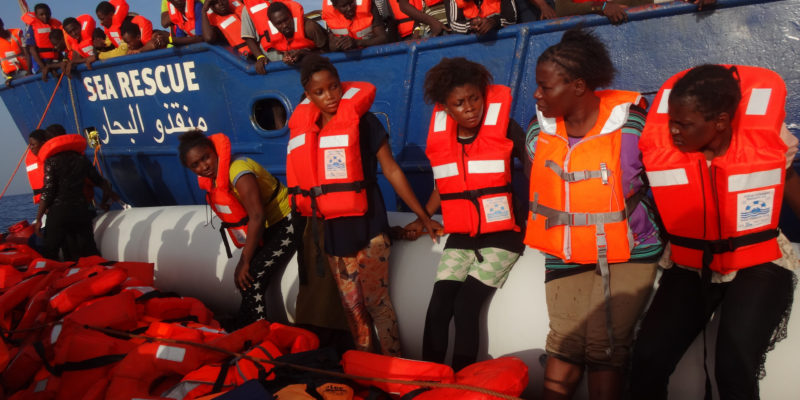1. Europe’s hypocrisy about Libya
Following a CNN report denouncing the existence of a slave market in Libya, the world has suddenly become aware of the horrible abuse facing migrants in the African country. World leaders expressed outrage and vowed to step in as soon as possible to end this horror. The reality is that the systematic abuse, torture, sexual violence, enslavement and killing of migrants is hardly a surprise, and it was well known for years. Despite this, European leaders chose to make Libya their ally in the management of migrant flows. Read the op-ed by Giulia Laganà in Refugees Deeply on Europe’s hypocrisy about Libya, as well as Karen Attiah’s op-ed in the Washington Post.
2. Europe’s responsibilities in Libya
Amnesty International has accused European governments of being aware of and complicit in the abuse and torture against thousands of refugees and migrants, detained in appalling conditions in Libya. The recent report “Libya’s dark web of collusion” describes how European Governments are actively supporting a sophisticated system of violence and exploitation against migrants and refugees at the hands of the Libyan Coast Guard, detention officials and people smugglers. A must read.
3. Italy’s responsibilities in the pushbacks to Libya
Are the Libyan Coast Guard the only ones responsible for migrants being returned to Libya? Despite Italy’s repeated attempts to distance itself from what is happening out at sea, complicity in the Libyans’ actions is becoming increasingly harder to deny. Read Paolo Biondi’s in-depth story in Border Criminologies.
4. Italy has a plan to hand sea rescues over to Libya
Despite growing concerns over Libya and the pushback of migrants at sea, Italy appears to have an ambitious plan to completely outsource “sea rescues” to the Libyan Coast Guard within the next three years. Meanwhile, news broke that Libya has abandoned rescue operations outside its territorial waters; Tripoli’s decision was transmitted last week to the International Maritime Organization. Read Steve Scherer and Aidan Lewis’s exclusive for Reuters and Nello Scavo’s article in Avvenire (as well as con Ottavia Spaggiari’s article in Vita).
5. The Minniti law on immigration is being taken to court for the first time
A refugee who escaped the horrors of Libya’s detention camps is now taking the Minniti law on immigration to court. The young man sought asylum in Italy, where the Territorial committee and the Court of Naples ruled that “events that took place in Libya or any country other than the country of origin are irrelevant to the asylum applications”. The Court of Naples also chose to listen to the man’s testimony without a video recording before the committee (as required by the Minniti-Orlando law). Now the attorneys from the Association for Juridical Studies on Immigration (ASGI) are taking this emblematic case to the Court of Cassation. Read Annalisa Camilli’s article in Internazionale.
6. Out in the cold / 1: Migrants in the snow at Italian borders
Since Hannibal and his elephants crossed them over 2,000 years ago, the Western alps have been a passage. For today’s migrants, however, the Italian mountains are more like a wall. The Susa Valley and Bardonecchia, Italy’s westernmost town, have become an increasingly important transit area in the last year. But crossing from France into Bardonecchia through the Col de l’Échelle is almost impossible in winter, given the weather. This hasn’t stopped asylum seekers from braving the cold and risking fatal accidents. Read the report by Radio Beckwith and Lodovico Poletto’s article in La Stampa.
7. Out in the cold / 2: Migrants abandoned in Calais
Things are not much better across the French border. Migrants and asylum seekers in Calais are facing desperate conditions as winter draws near, with French police officers often seizing or destroying the refugees’ few protections (tents, sleeping bags, clothes) against the cold in the attempt to discourage them from lingering. Read the updates by Human Rights Watch.
8. Europe is split over migrant quotas
European leaders have gathered in Brussels for the European Council, and an east-west split has emerged over the issues of migration and asylum.
The most divisive point is the principle of redistribution of asylum seekers through a system of mandatory quotas, as required by the reform of the Dublin Regulation (which was just passed by the European Parliament). While Hungary, Poland and the Czech Republic have openly sided against the quotas, in line with the stance taken by President of the Council, Donald Tusk, Austria has now become the first Western European country with an openly anti-immigrant government.
Read about the situation in Europe in this article by Annalisa Camilli for Internazionale and Matthew Karnitschnig’s article in Politico on Austria.
9. Migrants are here to stay
Meanwhile, on International Migrants Day, European Commissioner for Migration and Home Affairs Dimitris Avramopoulos wrote an op-ed in Politico: migrations cannot be stopped, and it’s time Europe started to rethink its policies accordingly.
10. The genocide of the Rohingya
«A textbook case of ethnic cleansing», the UN called it. But what is happening to the Rohingya in Myanmar is a full-scale genocide, which we haven’t been able to call by its real name. All of this is explained in the op-ed by Nick Kristof in the New York Times. Also read this survey by Xchange, the in-depth article by our own Corallina Lopez Curzi for Rights Info and our own op-ed on how wrong it is to return Rohingya refugees from Bangladesh to Myanmar.
Bonus: the new IOM portal on migration data
The International Organization for Migration (IOM) centre for data analysis on global migration has launched a new portal which gathers and illustrates all available data on the subject. An invaluable resource to be explored.
Translation by Francesco Graziosi.
Cover image: Brainbitch (CC BY-NC 2.0).









